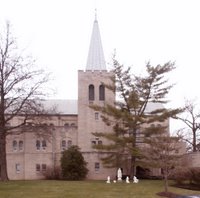
A view of the church, looking from the west.
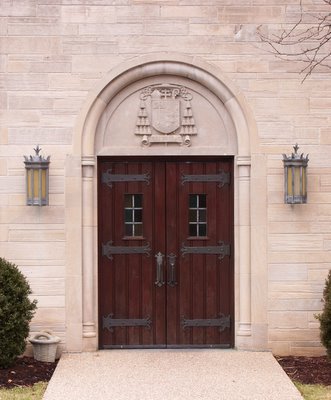
One of several exterior doors.
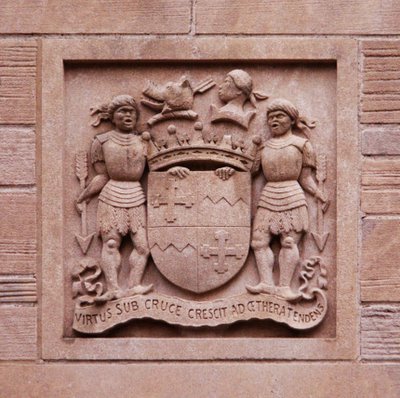
This stone carving is over the east door. The translation of the Latin is reportedly "virtue increases under a cross until it reaches the heavens".
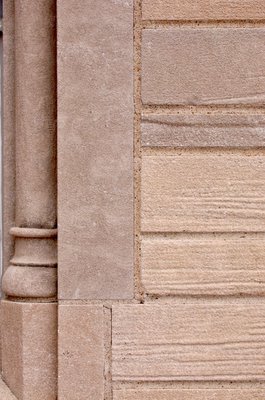
Exterior detail of some stonework. Nonmodern architecture includes detail on a human scale; the base of the attached column is only a few inches tall. The cut stone even has some detail of art in the finish of the face. The stone itself has natural detail that harmonizes with the human-made detail.
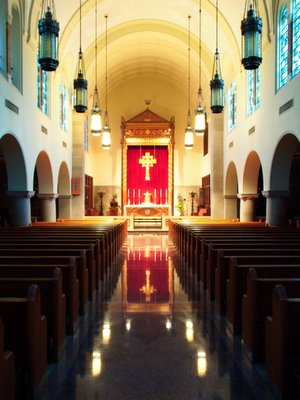
Inside the nave, looking towards the main altar. The church has the form of a Latin cross; side altars are in the transepts, and all the pews face foreward. There are aisles running down the sides behind the columns.
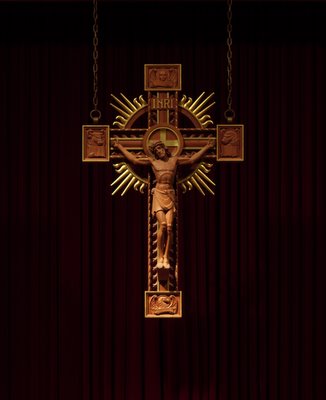
The crucifix. Large crucifixes such as this became common in the West during the High Middle Ages and is a familiar symbol of and object of devotion of Latin Christianity. On the ends of the cross are symbols of the Evangelists.
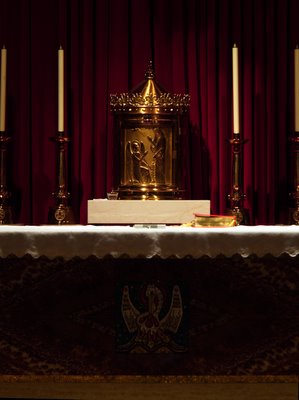
The tabernacle containing the Blessed Sacrament, with a depiction of the Annunciation. It is centered behind the detached main altar.
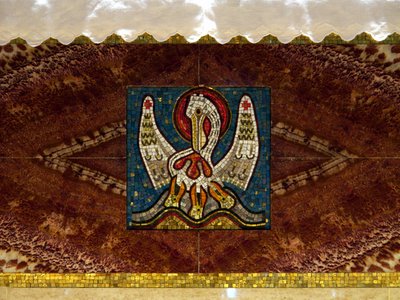
Detail of the altar, with a mosaic of the Christian symbol of the pelican. Sir Thomas Malory shows this symbol in his book Le Mort d'Arthur, his Christian romance story of King Arthur: "And so a little from thence he looked up into a tree, and there he saw a passing great bird upon an old tree, and it was passing dry, without leaves; and the bird sat above, and had birds, the which were dead for hunger. So smote he himself with his beak, the which was great and sharp. And so the great bird bled till that he died among his birds. And the young birds took the life by the blood of the great bird. When Bors saw this he wist well it was a great tokening..."
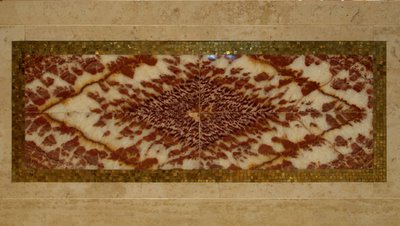
A detail of the communion rail. Note how the natural pattern in the stone is transformed by art into a symmetric design. Nonmodern design often uses natural patterns not merely in themselves, but in harmony with manmade-elements.
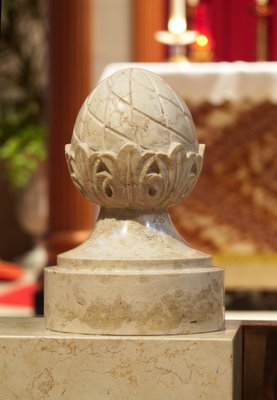
A pinecone finial on the end of the communion rail. The Christian symbol of the pinecone represents rebirth and forms the crown of the Tree of Life.
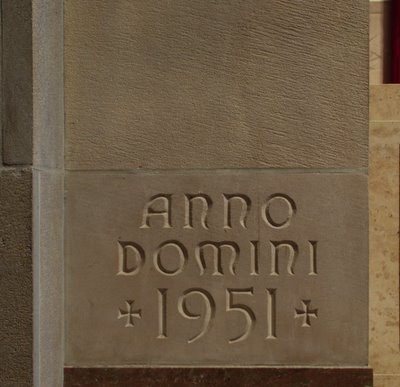
The Year of Our Lord 1951. This stone is set to the left of the communion rail. Within a few years, Modernism became universal in church design; but this church itself has elements of that trend, which began decades before, with a reduction of detail and symbolism.
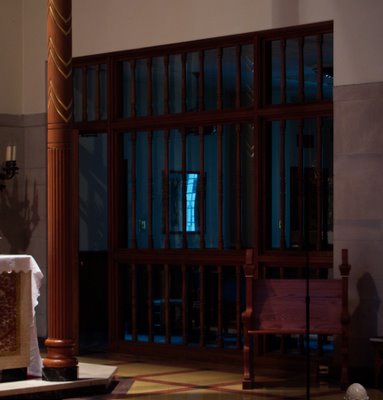
To the right of the altar is the glass-enclosed "cry room". It has become a tragedy in recent decades for many mainstream denominations: there is a deadly silence during their services because they lack children, and therefore, lack a future. In Europe, even Catholic churches have this silence of death.
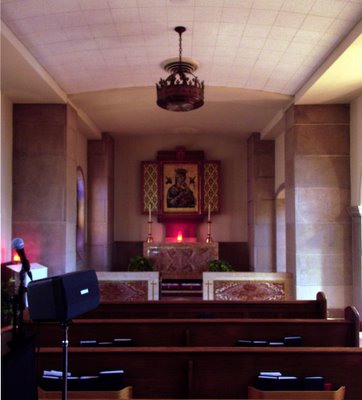
To the left of the main altar, in the west transept, is the altar of the Blessed Virgin Mary. This altar was in near total darkness, lit only by a red candle, and with what little light came through the dark stained glass windows on a dreary, overcast day.
"Why must holy places be dark places?" demanded the pagan Queen Orual in C.S. Lewis's novel Till We Have Faces. Orual, who hated the gods for taking away her beloved sister Psyche and for her own lack of physical beauty, veiled her ugly face from all. But it was her soul that was truly ugly. As she found out, we cannot see God face-to-face until we have a face; ours is veiled in the darkness of sin.
Shouldn't our Christian churches be bright, open, and airy? Shouldn't Redeemed Man be illuminated by the sun? Isn't this darkness a relic of our pagan, superstitious past?
But it was the Enlightenment—the belief that Man should conquer nature and determine his own destiny—that demanded that the Light of Reason flow into his meeting-houses. Man then is arrogant, and elevates himself to be a pagan god. But Man remains sinful, and the horrors of the 'Enlightened' 20th century should remind us that we remain in spiritual darkness.
This church of the Annunciation commemorates the Holy Spirit overshadowing the Blessed Virgin Mary. What is dark for us is not dark for the Lord; from Psalm 139:
If I say: "Let the darkness hide meGod is to be our light, not our own Reason. That is why the Blessed Sacrament is well-lit; and often hidden clear windows illuminate the sanctuary in an otherwise dark church.
and the light around me be night,"
even darkness is not dark for you
and the night is as clear as the day.
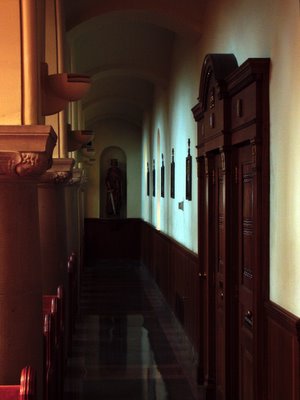
The aisle running down the western side of the name. In the background is a statue of Saint Louis, principal patron of the Archdiocese. To the right is a confessional.
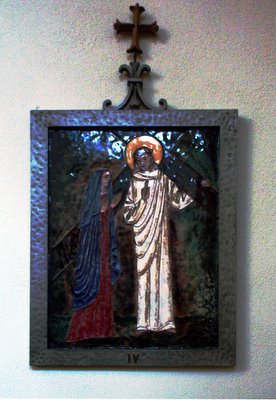
One of the Stations of the Cross, which are located in the side-aisles. It appears to be made of enameled metal.
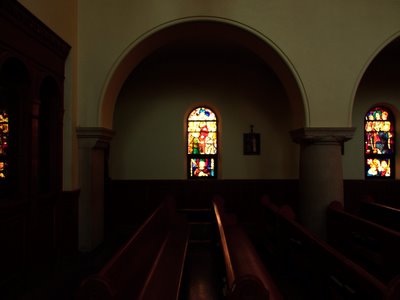
A view of the arches between the side-aisle and nave.
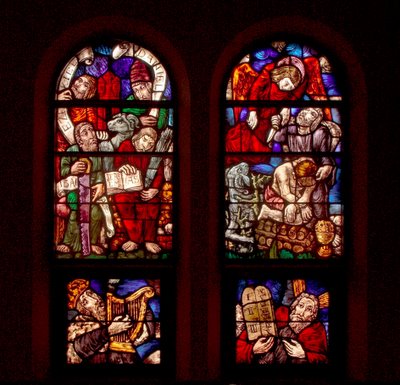
One of the stained glass windows. It depicts the Old Testament prophets, King David with his lyre, the Sacrifice of Abraham, and Moses with the Ten Commandments.
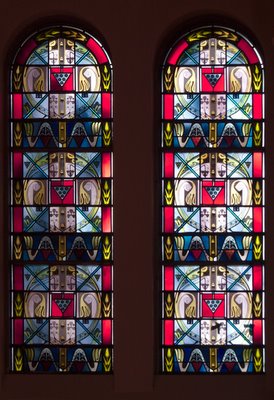
One of the clerestory windows, located high up on the nave walls. These typically are more abstract than the windows at eye-level, and are lighter in color, to allow a certain amount of filtered, indirect light into the main body of the church.
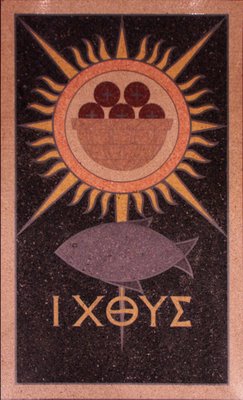
This mosaic is in the floor in front of the main altar. We have a basket of loaves and a fish, depicting one of the miracles of the Lord, and it is a sign of the Eucharist. The fish is one of the earliest Christian symbols, and is a common image in the Gospels. The Greek word for fish, ichthus, is also taken to be an acronym for Iesous Christos Theou Uiou Soter, or "Jesus Christ, God's Son, Savior."
Note that the rays coming from the basket of loaves is similar to those coming from Christ on the crucifix; and in turn both are similar to the rays used on a monstrance. It is not a coincidence.
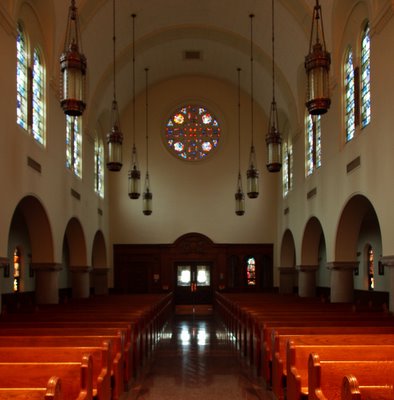
A view to the back of the church.
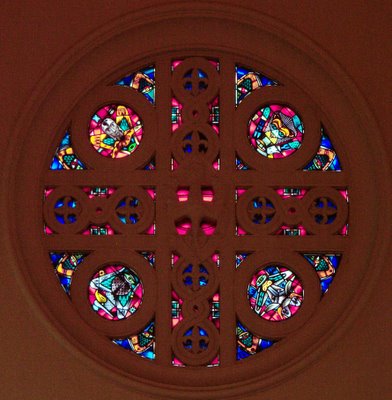
The rose window in the back of the church. Symbols of the Evangelists are in this window.
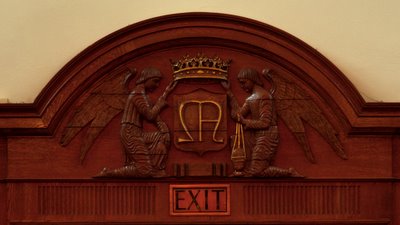
Wood carving over the front door to the church; two angels holding the crown of Christ the King, who is the Alpha and Omega, First and Last.
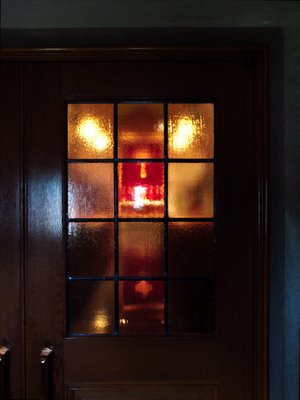
Here we take one last look back into the church from the narthex.
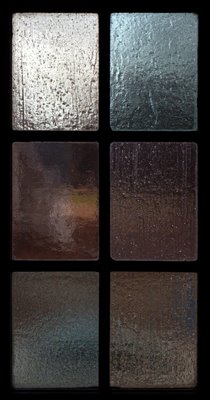
A look out the front door windows to Clayton Road below.
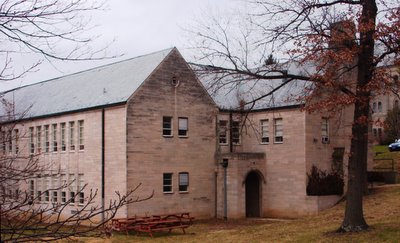
Here is the church's school.


This was my mother parish growing up. We attended daily mass here at 7AM for years and years. I wonder if Fr Krawinkle is still there? (doubtful)
ReplyDeleteAs for dark places v light ones...I suppose there is something to the cultivation of mystery within a dark space. I always loved the church to be just a little dark and shadowy. I found it more meditative and inspiring.
Annuziata was a decidedly "low-mass" kind of place. The good people of Ladue would have found anything else to be, well, vulgar. Though, and not to be uncharitable, the music was in bad taste and the abbreviated liturgies generally left one cold and uninspired. However, it was certainly in better taste than the "let's hold hands and rock the heavens" masses going on elsewhere.
If you want light visit St Anselm out on Mason Rd. It is a terrific Mid-Century Modern church, which I gather is not your thing, but light filled it is. I hope they don't tear it down. It would be a shame. It is such a great testament to its time, architecturally speaking.
ooops, I read the rest of your comment on dark v light. Thank you so much for this blog, it is really inspiring me, revisiting all of these places that had such an impact on my formation.
ReplyDeleteIt's the Glory of God to conceal a matter .The Honor of Kings is to Search it out
ReplyDelete